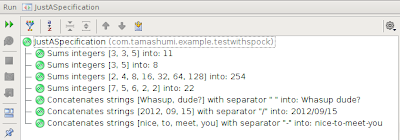One of a reasons your controller doesn’t render a proper response in JSON format might be wrong package name that you use. It is easy to overlook. Import are on top of a file, you look at your code and everything seems to be fine. Except response is still not in JSON format.
Consider this simple controller:
<span class="keyword">class</span> <span class="class">RestJsonCatchController</span> {<br /> <span class="keyword">def</span> <span class="method">grailsJson</span>() {<br /> <span class="method">render</span>([<span class="field">first</span>: <span class="string">'foo'</span>, <span class="field">second</span>: <span class="number">5</span>] <span class="keyword">as</span> grails.converters.<span class="class">JSON</span>)<br /> }<br /><br /> <span class="keyword">def</span> <span class="method">netSfJson</span>() {<br /> <span class="method">render</span>([<span class="field">first</span>: <span class="string">'foo'</span>, <span class="field">second</span>: <span class="number">5</span>] <span class="keyword">as</span> net.sf.json.<span class="class">JSON</span>)<br /> }<br />}<br />
And now, with finger crossed… We have a winner!
<span class="keyword">$</span> curl localhost:8080/example/restJsonCatch/grailsJson<br />{"first":"foo","second":5}<br /><span class="keyword">$</span> curl localhost:8080/example/restJsonCatch/netSfJson<br />{first=foo, second=5}<br />
As you can see only grails.converters.<span class="class">JSON</span> converts your response to JSON format. There is no such converter for net.sf.json.<span class="class">JSON</span>, so Grails has no converter to apply and it renders Map normally.
Conclusion: always carefully look at your imports if you’re working with JSON in Grails!
Edit: Burt suggested that this is a bug. I’ve submitted JIRA issue here: GRAILS-9622 render as class that is not a codec should throw exception
 Couple of years ago I wasn't a big fan of unit testing. It was obvious to me that well prepared unit tests are crucial though. I didn't known why exactly crucial yet then. I just felt they are important. My disliking to write automation tests was mostly related to the effort necessary to prepare them. Also a spaghetti code was easily spotted in test sources.
Couple of years ago I wasn't a big fan of unit testing. It was obvious to me that well prepared unit tests are crucial though. I didn't known why exactly crucial yet then. I just felt they are important. My disliking to write automation tests was mostly related to the effort necessary to prepare them. Also a spaghetti code was easily spotted in test sources.
